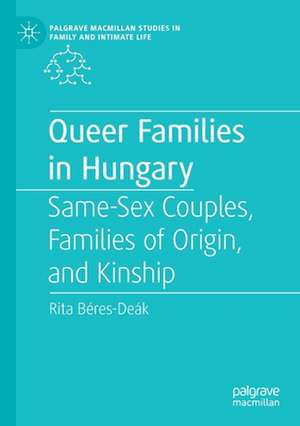Queer Families in Hungary: Same-Sex Couples, Families of Origin, and Kinship: Palgrave Macmillan Studies in Family and Intimate Life
Autor Rita Béres-Deáken Limba Engleză Paperback – 28 aug 2020
| Toate formatele și edițiile | Preț | Express |
|---|---|---|
| Paperback (1) | 387.38 lei 6-8 săpt. | |
| Springer International Publishing – 28 aug 2020 | 387.38 lei 6-8 săpt. | |
| Hardback (1) | 502.73 lei 6-8 săpt. | |
| Springer International Publishing – 28 aug 2019 | 502.73 lei 6-8 săpt. |
Din seria Palgrave Macmillan Studies in Family and Intimate Life
-
 Preț: 389.88 lei
Preț: 389.88 lei - 15%
 Preț: 642.83 lei
Preț: 642.83 lei -
 Preț: 391.61 lei
Preț: 391.61 lei -
 Preț: 388.72 lei
Preț: 388.72 lei -
 Preț: 388.13 lei
Preț: 388.13 lei -
 Preț: 388.72 lei
Preț: 388.72 lei - 15%
 Preț: 640.71 lei
Preț: 640.71 lei -
 Preț: 391.02 lei
Preț: 391.02 lei - 15%
 Preț: 700.94 lei
Preț: 700.94 lei -
 Preț: 389.88 lei
Preț: 389.88 lei -
 Preț: 387.75 lei
Preț: 387.75 lei -
 Preț: 396.40 lei
Preț: 396.40 lei -
 Preț: 394.12 lei
Preț: 394.12 lei -
 Preț: 382.18 lei
Preț: 382.18 lei -
 Preț: 388.72 lei
Preț: 388.72 lei -
 Preț: 387.38 lei
Preț: 387.38 lei - 15%
 Preț: 702.24 lei
Preț: 702.24 lei -
 Preț: 390.93 lei
Preț: 390.93 lei -
 Preț: 386.81 lei
Preț: 386.81 lei -
 Preț: 388.72 lei
Preț: 388.72 lei - 15%
 Preț: 640.88 lei
Preț: 640.88 lei -
 Preț: 389.70 lei
Preț: 389.70 lei -
 Preț: 386.39 lei
Preț: 386.39 lei -
 Preț: 388.13 lei
Preț: 388.13 lei - 15%
 Preț: 643.34 lei
Preț: 643.34 lei - 15%
 Preț: 585.73 lei
Preț: 585.73 lei -
 Preț: 392.60 lei
Preț: 392.60 lei -
 Preț: 386.81 lei
Preț: 386.81 lei -
 Preț: 381.00 lei
Preț: 381.00 lei -
 Preț: 392.60 lei
Preț: 392.60 lei -
 Preț: 387.58 lei
Preț: 387.58 lei -
 Preț: 382.95 lei
Preț: 382.95 lei -
 Preț: 385.62 lei
Preț: 385.62 lei -
 Preț: 392.60 lei
Preț: 392.60 lei -
 Preț: 386.81 lei
Preț: 386.81 lei -
 Preț: 390.08 lei
Preț: 390.08 lei -
 Preț: 389.11 lei
Preț: 389.11 lei - 15%
 Preț: 589.02 lei
Preț: 589.02 lei -
 Preț: 387.20 lei
Preț: 387.20 lei - 15%
 Preț: 584.43 lei
Preț: 584.43 lei -
 Preț: 391.61 lei
Preț: 391.61 lei - 15%
 Preț: 582.80 lei
Preț: 582.80 lei -
 Preț: 392.60 lei
Preț: 392.60 lei -
 Preț: 386.81 lei
Preț: 386.81 lei -
 Preț: 388.72 lei
Preț: 388.72 lei -
 Preț: 389.70 lei
Preț: 389.70 lei
Preț: 387.38 lei
Nou
Puncte Express: 581
Preț estimativ în valută:
74.14€ • 77.11$ • 61.20£
74.14€ • 77.11$ • 61.20£
Carte tipărită la comandă
Livrare economică 14-28 aprilie
Preluare comenzi: 021 569.72.76
Specificații
ISBN-13: 9783030163211
ISBN-10: 3030163210
Pagini: 294
Ilustrații: VII, 294 p. 4 illus.
Dimensiuni: 148 x 210 mm
Greutate: 0.4 kg
Ediția:1st ed. 2020
Editura: Springer International Publishing
Colecția Palgrave Macmillan
Seria Palgrave Macmillan Studies in Family and Intimate Life
Locul publicării:Cham, Switzerland
ISBN-10: 3030163210
Pagini: 294
Ilustrații: VII, 294 p. 4 illus.
Dimensiuni: 148 x 210 mm
Greutate: 0.4 kg
Ediția:1st ed. 2020
Editura: Springer International Publishing
Colecția Palgrave Macmillan
Seria Palgrave Macmillan Studies in Family and Intimate Life
Locul publicării:Cham, Switzerland
Cuprins
1. Introduction and Context.- 2. The Family in (Post)socialist Hungary.- 3. Approaches to kinship in the Hungarian LGBTQ community.- 4. Visibility.- 5. Queer Families Performing Kinship.- 6. Family members becoming allies.- 7. Beyond the Heterosexual Family Myth, or how to queer the family.
Recenzii
“The diverse and creative ways in which these families approach parenting, gender arrangements, and ultimately their understandings of kinship not only speak to their incredible resilience but also offers a road map to how heterosexual families could alter and overcome heteronormative and strictly gendered kinship.” (Anita Kurimay, Hungarian Studies Review, Vol. 50 (1-2), November, 2023)
Notă biografică
Rita Béres-Deák is a cultural anthropologist and LGBTQ activist based in Hungary.
Textul de pe ultima copertă
Set against the backdrop of a country which upholds a heteronormative and narrow view of family, this book provides insights into the lives of Hungarian same-sex couples and their heterosexual relatives. Béres-Deák utilizes the theoretical framework of intimate citizenship, as well as findings from ethnographic interviews, participant observation and online sources. Instead of emphasizing the divide between non-heterosexual people and their heterosexual kin, the author recognizes that these members of queer families share many similar experiences and challenges.Queer Families in Hungary looks at experiences of coming out, negotiation of visibility, and kinship practices, and offers valuable insights into how individuals and families can resist heterosexist constraints through their discourses and practices. Students and scholars researching kinship studies, LGBT and queer studies, post-socialist studies, and citizenship studies, will find this book of interest.
Caracteristici
Applies a queer framework to issues of kinship Engages with questions of visibility, inclusion/exclusion and family members as allies Offers important contributions to kinship studies, LGBT studies and postsocialist studies, as well as research on intimate citizenship
